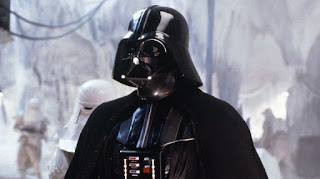Brooding Romantic hero Heathcliff and the most terrifying villain of the Galactic Empire? Seems hard to grasp unless you know that our image of Heathcliff’s character has been heavily influenced by the numerous film versions, the majority of which are only interested in the love story between Heathcliff and Cathy and forget the rest of the book, where he’s frankly a bit of a shit!
Most film adaptations of Wuthering Heights end with Cathy’s death, after which hers and Heathcliff’s ghosts wander the moors, never to be parted for all eternity. Ahh how romantic! Except that Cathy dies about a third of the way into the book. Love story kaput. After that Heathcliff spends the rest of the novel exacting violent revenge on all those around him and generally making everyone, including his and Cathy’s children’s, lives miserable, until he finally gets to meet her ghost again at the very end of the novel.
So, our notion of Wuthering Heights is much like (horror of horrors) only having seen the prequel Star Wars trilogy. The Heathcliff of the first part of the book and the film adaptations, most notably the version of the character created by Lawrence Olivier in the famous 1939 version, is basically prequel Anakin. Whereas the Heathcliff of the later part of the book savagely sadistic, vengeful, devoid of empathy and with all the charm of a constipated nightclub bouncer has more in common with Darth Vader. Same character.
Still not sure? Let’s look at the evidence.
1. Mysterious origins
Heathcliff is an orphan found on the streets of Liverpool and brought to live with the Earnshaw family. From the very beginning there is something ‘other’ about him, something evil. He’s described as a fiend; some characters even speculate that he may be the devil.
Anakin has no father. He seems to have just sprung into creation, possibly when Palpatine’s Sith Master Darth Plagueis figured out how to manipulate the force into creating life. If that’s true, then like Heathcliff, Anakin could be evil incarnate.
2. All-encompassing passion for a woman
Both Heathcliff and Anakin grow up and fall madly in love with a beautiful woman forbidden to them. Each end up pushing her away and eventually lose her to premature death. They’re both destroyed by this, completely unable to move on and become obsessed with the object of their passion returning to them.
‘I will do whatever you ask. Just help me save Padme's life. I can't live without her. If she dies, I don't know what I will do.’ Anakin Skywalker, Revenge of the Sith
‘Do not leave me in this abyss alone […] I cannot live without my life and I cannot live without my soul’. Heathcliff, Wuthering Heights (16:25)
3. Personality
Heathcliff practically embodies the code of the Sith. He is passionate, arrogant and proud, a man who hates as deeply as he loves. Despite displaying a high level of intelligence and ability, he is self-destructive. He chooses exile out of a hatred for social institutions and norms.
The Darth Vader we meet at the beginning of the original trilogy has become an inhuman monster. He thinks of nothing but power and, like Heathcliff, his need to survive at all costs has driven out the space in his soul for other people.
Both men are cold, brutal and ruthless with a lot of anger management issues. Heathcliff never quite mastered the art of force choking but given the amount of physical violence he dolls out to his hapless wife and son you get the distinct impression he’d have been on it like white on rice.
‘That's not the plan. The tyrant grinds down his slaves and they don't turn against him; they crush those beneath them.’ – Heathcliff, Wuthering Heights (11.51)
Darth Vader: <after force choking Admiral Ozzel to death> ‘You are in command now... Admiral Piett!’
Admiral Piett: ‘Thank you, Lord Vader’
- The Empire Strikes Back
4. Ghostly redemption
Heathcliff believes in communication from beyond the grave and longs to join Cathy in the afterlife. Just a glimpse of her ghost is enough to make him give up on his obsessive revenge, and he dies soon after.
‘I have a strong faith in ghosts; I have a conviction that they can, and do exist, among us!’ Heathcliff (29.24).
Darth Vader, whilst redeemed by the love of his son allows himself to once more believe in the power of unconditional love and when he dies is finally allowed to join the ghost the immortal souls of Obi-Wan and Yoda as they watch over Luke during the rebel celebration on Endor.
Which all in all makes you wonder how they got the casting in the prequel trilogy so wrong.
Imagine if they’d have got the sort of actor who usually gets the role of Heathcliff to play Anakin. Tom Hardy and Michael Fassbender are only a few years older than Hayden Christenson, either could have played the role as a true Byronic hero. A proud man unwilling to bow for anyone, wrestling with his internal conflict rather than a petulant teenager having a strop because the Jedi wouldn’t let them play with their toys.
Just imagine that, remembering prequel Anakin not as a whiny little shit who ruined Star Wars, but as a great tragic hero for our generation. Really George Lucas, what would Emily Bronte say?


No comments:
Post a Comment